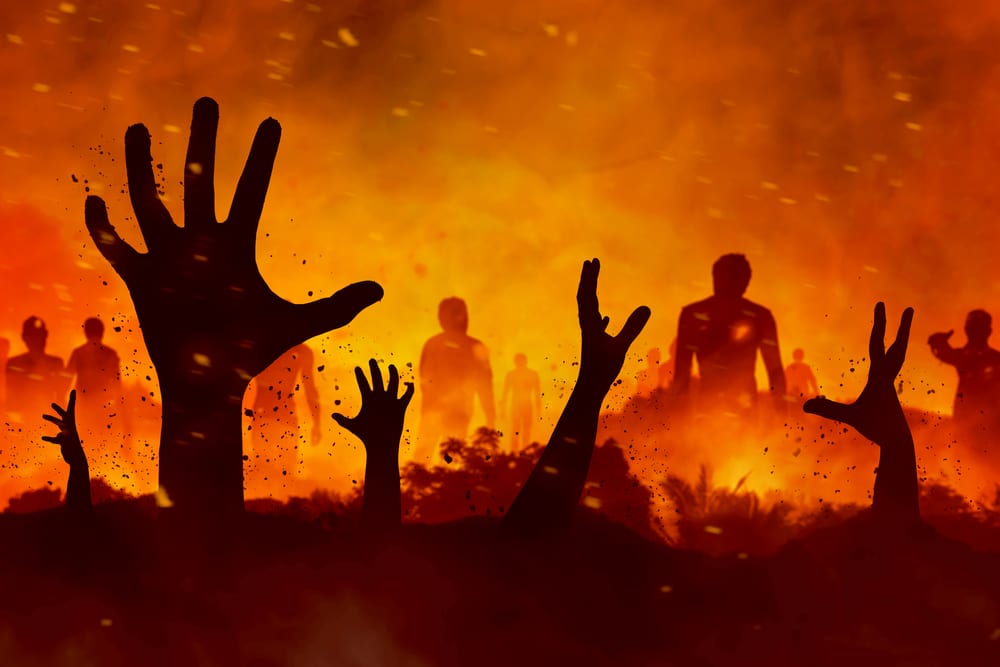Religion
Related: About this forumOur Beliefs About Hell Have Shifted Over Time and Influenced Our Culture
https://friendlyatheist.patheos.com/2019/01/22/our-beliefs-about-hell-have-shifted-over-time-and-influenced-our-culture/
Our Beliefs About Hell Have Shifted Over Time and Influenced Our Culture
By Sarahbeth Caplin, January 22, 2019
The idea of Hell shapes the way we think — even if people don’t believe it even exists. Vinson Cunningham of the New Yorker took a look at the history of Hell in a recent article.The further from childhood I get, the fewer people I meet who worry about — or even believe in — what Scott G. Bruce, the editor of a new and quite terrifying compilation, “The Penguin Book of Hell,” calls the “punitive afterlife.” But the Hell here on earth — the one that the preachers promised would lose in the end — hasn’t gone anywhere. You might even notice a slight uptick, these days, in its invocation. As a metaphor for global warming, hellfire is almost too on the nose. There are also the grim jokes about how, during our most recent and most wretched Presidential election, we all surely died and boarded the first elevator downstairs, where we are now in permanent residence. (Search Twitter for the phrase “We are literally in Hell” and let the scenarios wash over you.)
…
It’s not only the liberals and the environmentally concerned who are prone to invoking Hell to convey the current state of things. When Donald Trump, during his downbeat Inaugural Address, conjured an “American carnage” that left “rusted-out factories scattered like tombstones across the landscape of our nation,” and “crime and gangs and drugs that have stolen too many lives and robbed our country of so much unrealized potential,” what was he describing but a national apocalypse, a Hades in Chicago and at the border? Our ancestors developed their ideas of Hell by drawing on the pains and the deprivations that they knew on earth. Those imaginings shaped our understanding of life before death, too. They still do.
Whether you believe Hell is a literal place or part of an ancient myth, it remains a powerful metaphor and descriptor in our modern language. While some religious people let go of Hell early on in their path to atheism, others hold onto that belief as long as possible.
Act_of_Reparation
(9,116 posts)A fancy word meaning, "Who knows? We're just making this shit up as we go."
trotsky
(49,533 posts)"...but if you don't respect our beliefs and stop questioning them, you're gonna be in trouble!"
NeoGreen
(4,033 posts)... is not even a subtext anymore.
Hell is their excuse to create pain here and now.
Moostache
(10,136 posts)So I've got THAT to look forward to I guess.
(* the REAL "hell" is the concept of an eternal, unchanging 'life' spent in praise and hommage to a deity that also never changes...after a few millennia I'd certainly be looking to join up with Satan for a little variety. ANY variety.)
The Genealogist
(4,736 posts)or any of the other legion of smug, self-righteous hinchpersons of the American radical right?
MineralMan
(147,445 posts)Because of that, people's belief about what it might be and its characteristics vary. If something doesn't exist so you can examine, you can think of it any way you wish, really.
That's very different from how science looks at, say, an atom. Our understanding of atoms has shifted over time. But that shift has been due our ability to actually examine real atoms in real ways. As our technology improves, we are better able to describe atoms and their structure. When I was a youngster, it was commonly believed that we would never be able to actually see an individual atom. In my lifetime, that has proven not to be true. We can now see individual atoms. We still can't see inside them, but we can see them. What will come next in our understanding of the atom? I don't know, but I know they exist and can be studied.
Hell has never been examined at all. It can't be, because it doesn't exist. So, all descriptions of it are simply the products of human imagination. Religion and science work very differently.